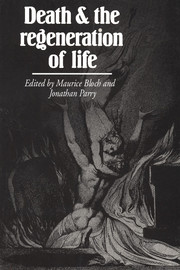Book contents
- Frontmatter
- Contents
- Preface
- Notes on contributors
- 1 Introduction: death and the regeneration of life
- 2 The dead and the devils among the Bolivian Laymi
- 3 Sacrificial death and the necrophagous ascetic
- 4 Witchcraft, greed, cannibalism and death: some related themes from the New Guinea Highlands
- 5 Lugbara death
- 6 Of flesh and bones: the management of death pollution in Cantonese society
- 7 Social dimensions of death in four African hunting and gathering societies
- 8 Death, women and power
- Index
8 - Death, women and power
Published online by Cambridge University Press: 05 June 2012
- Frontmatter
- Contents
- Preface
- Notes on contributors
- 1 Introduction: death and the regeneration of life
- 2 The dead and the devils among the Bolivian Laymi
- 3 Sacrificial death and the necrophagous ascetic
- 4 Witchcraft, greed, cannibalism and death: some related themes from the New Guinea Highlands
- 5 Lugbara death
- 6 Of flesh and bones: the management of death pollution in Cantonese society
- 7 Social dimensions of death in four African hunting and gathering societies
- 8 Death, women and power
- Index
Summary
This chapter attempts to generalise about the different practices relating to death in different cultures and different societies, and in particular to suggest explanations for differences in funerary practices such as whether there are important or unimportant rituals, whether corpses are thought of as polluting or not and whether bodies are destroyed or preserved. Striking cross-cultural recurrences such as the association of mourning and women will also be examined. This, however, is done here in terms of questions raised by a re-examination of data on the Merina of Madagascar presented elsewhere (Bloch, 1971).
The Merina are a people who live in central Madagascar and who number over a million. They were traditionally divided into localised kin-groups which we may call demes. These were groups of people who traditionally lived in clearly-defined geographical areas focused on a few river valleys which had been turned into irrigated rice fields. For the Merina the association between the people of the deme and the land of the deme is, and should be, eternal. Indeed, the notion of ancestral land, that is land belonging to the deme, is totally merged with the notion of ancestors. The ancestors had lived and were buried in the ancestral land; the land, in the form of terraces, had been made by the ancestors. This merging is so complete that it is quite usual for Merina to say who their ancestors were by giving the name of a village.
- Type
- Chapter
- Information
- Death and the Regeneration of Life , pp. 211 - 230Publisher: Cambridge University PressPrint publication year: 1982
- 48
- Cited by



